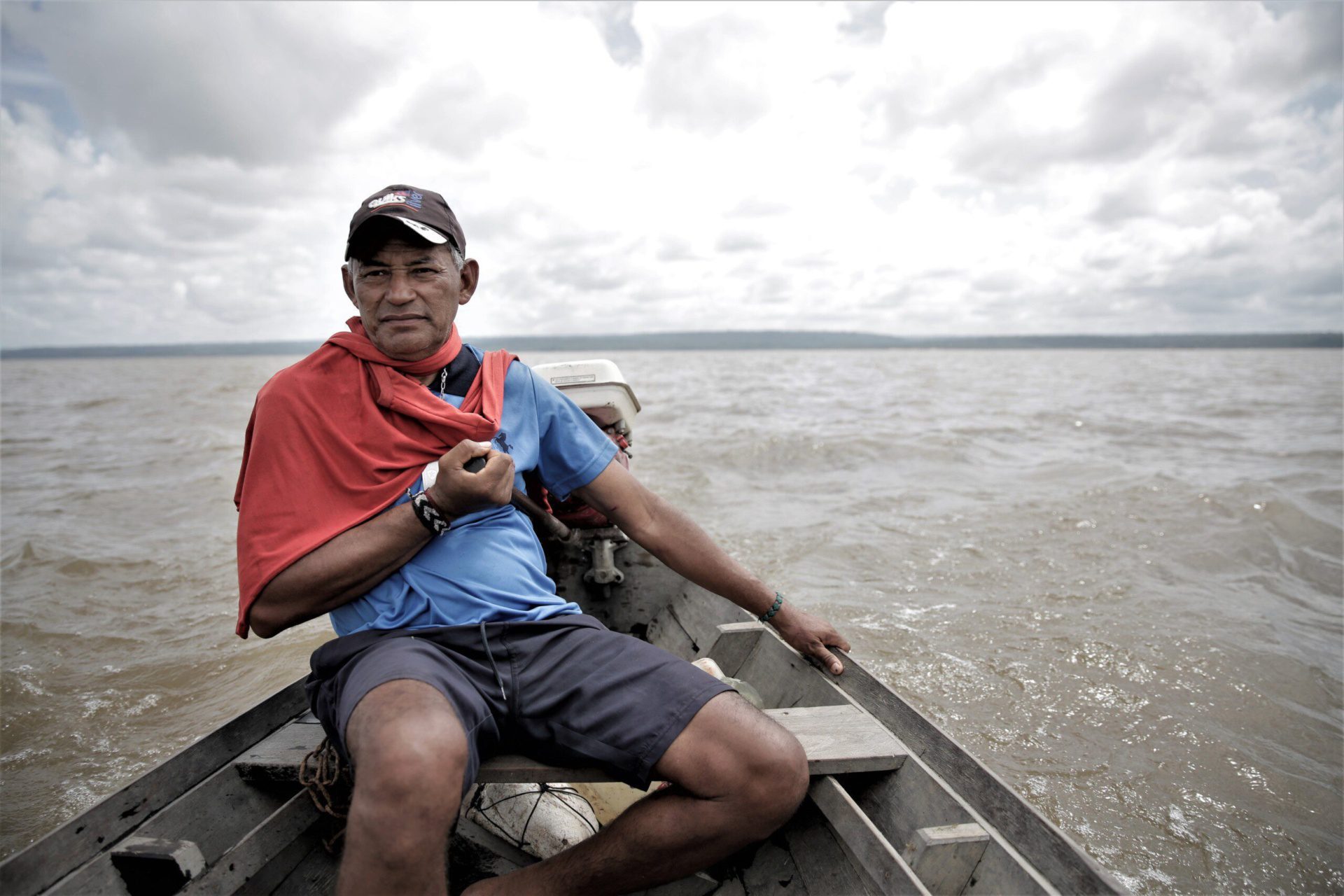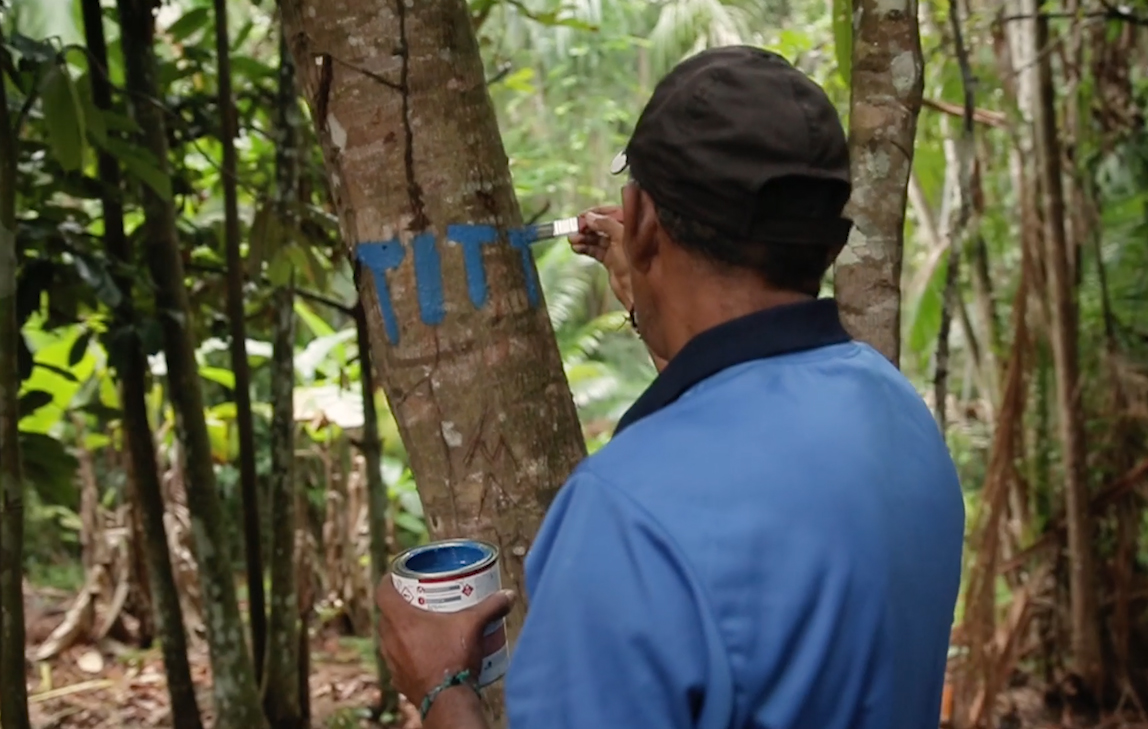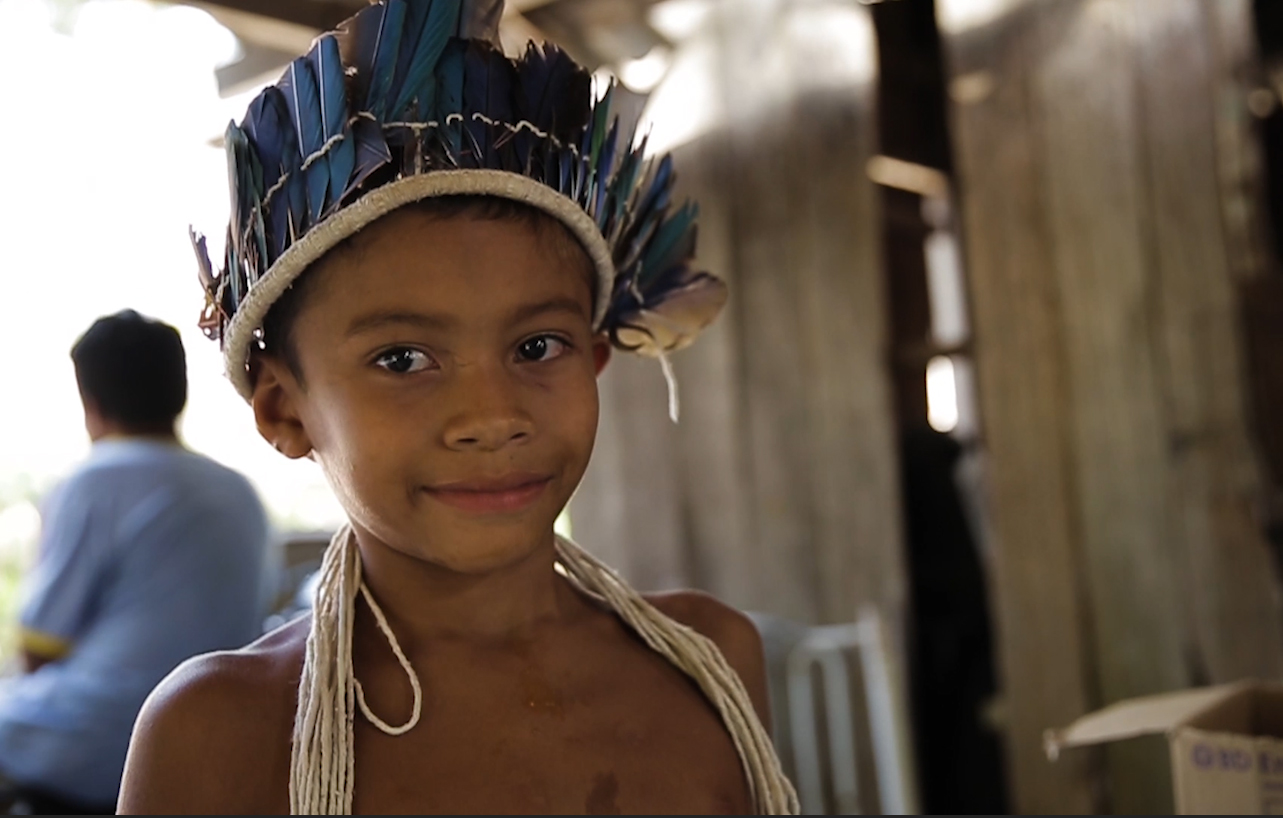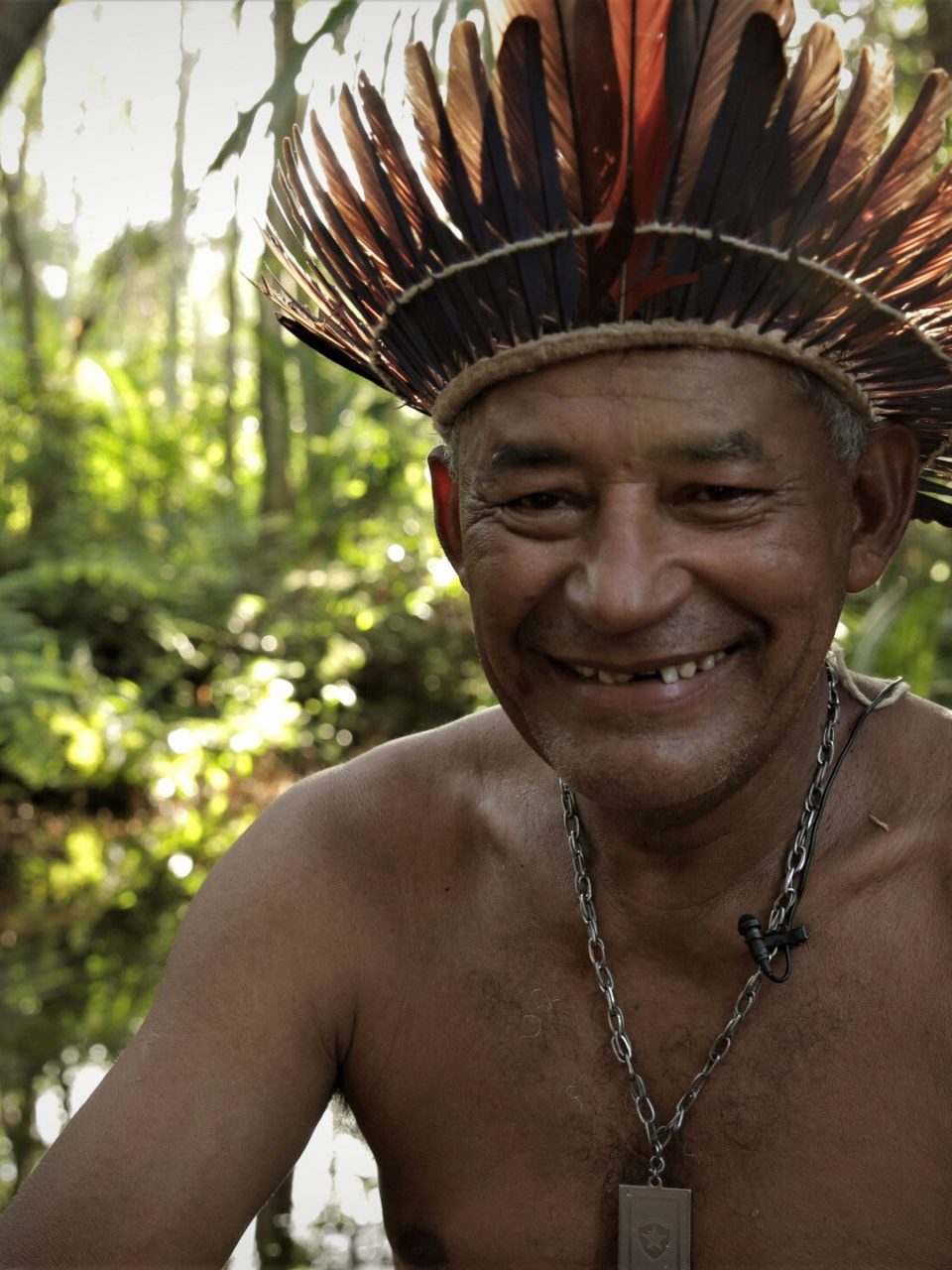Brás Antônio Marques de Castro is the traditional chief of 19 Tupinambá villages scattered across the Tapajós National Forest region between the cities of Santarém and Aveiro in the Brazilian state Pará. At the age of 61, he is concerned about the future of his family and community: To guarantee the future of not only the community but also the rainforest, a lot of work needs to be done.
In recent years, the Tupinambá community have devoted themselves to self-demarcation, so as to safeguard their lands and their children's future. When Antônio, as his relatives in the village of São Francisco call him, talks about this project, it soon becomes clear how important the work is to him. This demarcation, the marking of their own habitat, is about protecting the rainforest, but also about the rights of indigenous peoples.
Brás himself is the father of 13 children, six of them adopted. The family lives next to the river, in a traditionally built house with a wide roof that protects the family from the heavy rains of the Amazon rainforest, but without any walls.

Brás Antônio Marques de Castro, General leader of the Tupinambás Baixo Tapajós. Photo: Thomaz Pedro
The situation is grimmer than ever. For almost 20 years, the Tupinambás have lived peacefully on their lands, but multiple commercial projects are now being planned all at once. Loggers, soya farmers and gold panners are intruding deeper and deeper into the region, destroying the indigenous communities' habitat. This is despite the fact that the Tupinambás' lands are part of an extractive reserve for the preservation of biodiversity. For this reason, the community wants one thing above all else: to have its lands designated as indigenous territory as soon as possible and subsequently recognised as such by the authorities. "Despite everything, I have not lost hope that we can secure our home and the Tupinambás' traditional way of life," says Brás.
Demarcation: a long process
Self-demarcation is a complex task. The Tupinambás have to work with maps and GPS in order to orientate themselves and determine the boundaries of their habitat. In addition, penetrating the dense rainforest requires enormous physical effort. The Tupinambás are on the go for weeks at a time, marking trees and putting up signs.
"Cut there, cut here. Put the rest of the branches aside, so you can pass by. We need a chainsaw because a lot of branches fall in the forest. We need rubber boots for protection against poisonous animals because when we make our way through the jungle, we have to take care of ourselves. But we have hardly any means of doing so because machetes, tarpaulins and boots are too expensive for us… "
To have lands officially demarcated as indigenous territory by the Brazilian authorities, the indigenous people must prove that they have been living there for a certain period of time. Up until now, the indigenous protection authority FUNAI has provided assistance and support during this demanding process. The federal states where the demarcated lands are located must consent to the demarcation. Only then will the case go to the judicial authority. The demarcation is then ratified by presidential decree.
How the current government thinks
According to the law, the government is obliged to promote the recognition of indigenous lands. The constitution guarantees that indigenous peoples shall have permanent possession and exclusive use of their lands' mineral resources, rivers and lakes. After the constitution came into force, all indigenous territories should have been recognised within five years.
Although governments fell a long way short of fulfilling this obligation even before the election of today's president, Jair Messias Bolsonaro, the current government is explicitly and vehemently refusing to recognise new indigenous territories in Brazil. In his election campaign, Bolsonaro made himself very clear:
"Not one centimetre of land will be demarcated for indigenous reserves or quilombolas!"
In this context, Bolsonaro attempted to remove responsibility for demarcations from the indigenous protection authority FUNAI. Although this decision was reversed by the judiciary, FUNAI is now deeply divided and weakened, and can only defend indigenous peoples' rights to a minimal extent.
On top of this, the year 2019, Bolsonaro's first in office, was marked by a sad record of deforestation in the Amazon, forest fires and violence against indigenous peoples. Alarmingly, this trend also continued in 2020: In the shadow of the corona crisis, an area equivalent to 120,000 football pitches was deforested in the first four months. First of all, it is therefore essential that the indigenous communities themselves regularly monitor and demarcate their lands to protect them from illegal invaders. Secondly, the process preceding official recognition is a long one. Even though official recognition of territories hardly happens at all under the current national government, it is important to prepare and take the steps that lead to it.

le processus de la démarcation. Photo: Thomaz Pedro
The life of the Tupinambás
Cacique Brás is certain: "It is precisely in these times of uncertainty that indigenous communities must defend themselves! And they must do it together!" In the summer of 2019, he was re-elected as chief of the Tupinambá villages. Brás proudly and responsibly bears the title "cacique", the indigenous name for their leaders. Traditional indigenous knowledge is very important to him, but he also uses more modern technologies such as GPS and mobile phones to combat the destruction of the Amazon as effectively as possible. The Tupinambás are finding allies in the Munduruku community, who also live in the Tapajós region.
"We are all working together now. There is no longer this distinction between one here and the other there. Today, the indigenous communities, the indigenous movement, is united. It is now working for all of us and not just for a particular community," stresses Cacique Brás.
For his exemplary work, Cacique Brás received a boat from the municipality of Santarém, presented to him by the mayor in person. It was an enormous relief for the community: "We can use it to bring people to the cities in a medical emergency," explains Brás. It also facilitates communication and organisation between the villages. "Getting organised is difficult and complicated because the villages are so remote and the distances between them great. During the rainy season, for example, the river is very high and we need boats to travel to the next village."
Above all though, the Tupinambás can use the boat for self-demarcation, as it allows them to travel around the area more easily. However, each trip entails high petrol and maintenance costs, so the Tupinambás take care to use the boat prudently.

The life of the Tupinambás. Photo: Thomaz Pedro
The will to keep the indigenous communities united and to preserve the forest in the Lower Tapajós region dates back a long time. Brás is proud of his ancestors who, from the colonial era onwards, fought to preserve indigenous peoples' identity and the rainforest.
Brás also admires environmental activist Chico Mendes, a man who gave his life for the Brazilian Amazon. "Chico Mendes was a warrior," says Cacique Brás. Mendes was murdered because of his activism. The institute now responsible for the Tupinambás' extractive reserve, and meant to protect its biodiversity, was founded in his honour. This can only make it all the more painful for Brás to see this institute among those completely transformed by President Bolsonaro. Instead of protecting biodiversity, the institute is already issuing the first licences to sawmills. Loggers have now begun destroying the forest to construct a new road across the territory. Much like the indigenous protection authority FUNAI, the institute has been completely divested of its original purpose.
Despite an uncertain future, the fight goes on
"We are not interested in the commercial projects," says Cacique Brás by way of clarification. "But the government wants to take charge of them and move them along as quickly as possible."
At the moment, there is no certainty as to whether the extractive reserve can survive. Due to the urgency of the situation, the cacique wants to drive self-demarcation onwards himself. Not only the forest, but also the sacred river Rio Tapajós is in danger. The aim of the Tapajós-Teles Pires Waterway, as it is called, is to adjust the depth of rivers so that ferries and cargo ships can carry their cargo via canals to the port in the city of Santarém-PA without problems during periods when the water level is low. Brás fears the consequences:
"[...] the propellers of the tugboats, which move the ferries, swirl up clay from the bottom and make the water dirty. I am very worried that this will kill the tracajás (turtles) and frighten the fish."
These are difficult times for indigenous peoples in Brazil. They are confronted with a government led by a president who says his "dream" is to be able to exploit the Amazon commercially. Moreover, under Bolsonaro, the very institutions meant to protect indigenous peoples and the Amazon are pressing ahead with projects that pose a threat to indigenous peoples and their rights. As even environmental organisations are now beginning to exploit the forest, the importance of indigenous communities with regard to preservation of the Amazon becomes even greater. "The world should know what the Brazilian government is doing with the vast rainforests," says Cacique Brás. "Our lands must be demarcated, so we can preserve them and protect them from intruders."
The Society for Threatened Peoples is campaigning for the rights of indigenous peoples in the Brazilian Amazon and for protection of their lands. We are working closely with the Tupinambá community and facilitating their self-demarcation process by providing legal knowledge and financial contributions.

